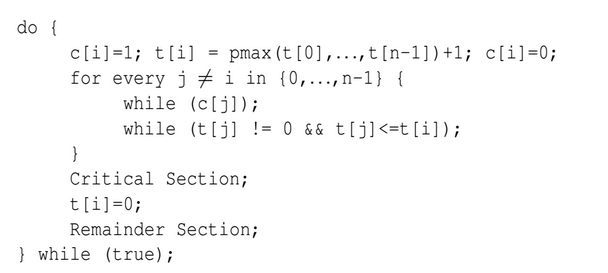Considere la siguiente solución propuesta para el problema de la sección crítica. Hay n procesos: P0 …Pn−1. En el código, la función pmax devuelve un número entero no menor que cualquiera de sus argumentos. Para todo i, t[i] se inicializa a cero.
¿Cuál de las siguientes es VERDADERA acerca de la solución anterior?
(A) Como máximo un proceso puede estar en la sección crítica en cualquier momento
(B) Se cumple la condición de espera limitada
(C) Se cumple la condición de progreso
(D) No puede causar un punto muerto
Respuesta: (A)
Explicación:
Mutual exclusion is satisfied: All other processes j started before i must have value (i.e. t[j]) less than the value of process i (i.e. t[i]) as function pMax() return a integer not smaller than any of its arguments. So if anyone out of the processes j have positive value will be executing in its critical section as long as the condition t[j] > 0 && t[j] <= t[i] within while will persist. And when this j process comes out of its critical section, it sets t[j] = 0; and next process will be selected in for loop. So when i process reaches to its critical section none of the processes j which started earlier before process i is in its critical section. This ensure that only one process is executing its critical section at a time.
Deadlock and progress are not satisfied: while (t[j] != 0 && t[j] <=t[i]); because of this condition deadlock is possible when value of j process becomes equals to the value of process i (i.e t[j] == t[i]). because of the deadlock progress is also not possible (i.e. Progress == no deadlock) as no one process is able to make progress by stopping other process.
Bounded waiting is also not satisfied: In this case both deadlock and bounded waiting to be arising from the same reason as if t[j] == t[i] is possible then starvation is possible means infinite waiting.
Esta explicación ha sido aportada por Dheerendra Singh.
Cuestionario de esta pregunta
Publicación traducida automáticamente
Artículo escrito por GeeksforGeeks-1 y traducido por Barcelona Geeks. The original can be accessed here. Licence: CCBY-SA